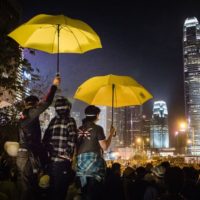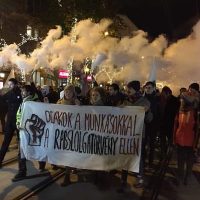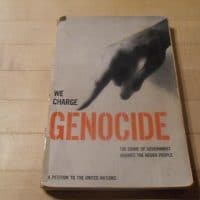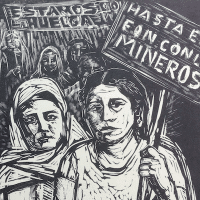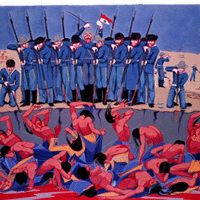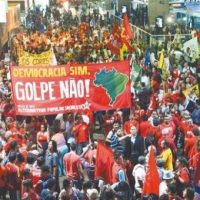-
Money & Power with Jamee Moudud
In this episode, we’re joined by Jamee Moudud, a professor of economics at Sarah Lawrence College, Jamee draws on the tradition of critical legal studies to extend the constitutional theory of money to new historical and international contexts.
-
Hungarians hit the street against ‘slave law’ that increases overtime
According to the new provision that was passed on Wednesday, employers can demand as much as 400 hours of overtime a year and can take three years to disburse the payments for the same.
-
Why are people hungry in North Carolina?
Tina Tru explains the facts about hunger in North Carolina—and looks at the kinds of policies, both local and system-wide, that could make a difference.
-
Cops in France brutalize high school students who join Yellow Vest protests
A scene of ordinary life in France, in these times of conflict: On Thursday, Dec. 6, late morning, in front of the gates of a secondary school in a very peaceful town in the Paris suburbs, about 100 students aged 15-17 are strolling from their high school to go to lunch, chatting, joking and relieved that the half-day classes are over.
-
‘Slave Bible’ converted slaves to Christianity by omitting parts that could lead to uprising
A new exhibit at a Washington, D.C., museum featuring an abridged version of the Bible sheds light on how Christian missionaries converted enslaved Africans to Christianity by teaching them the Gospel…except the parts about freedom, equality and resistance.
-
Marc Lamont Hill and the Legacy of Punishing Black Internationalists
Hill’s bold statement to the UN is part of the internationalist Black radical tradition, exemplified by Paul Robeson, the Black Panther Party, and today’s Black Lives Matter movement.
-
This economic policy has been a disaster, a calamity for the country’s public life
As AMLO begins his presidential term in Mexico, he has been confronted by years of neoliberal policies, policies crafted by institutions like the IMF and the World Bank, who praised the selling off of Mexico’s assets as a model. When protestors contest this agenda—as they recently did at the G20 meeting in Buenos Aires—, the reply from leaders comes written in tear gas. Meanwhile, tens of thousands of farmers and thousands more of those who stood with them marched across Delhi to demand a parliamentary session to address the agrarian crisis.
-
‘Civility’ is for white people
Even if the truth is unsavory, the dead deserve our condolences and respect. We must be civil. Especially if they are white.
-
Fred Hampton’s death is just one example of the Government’s covert disruption of Black Lives
The police lied and said that when they knocked on the door and announced themselves, the Panthers immediately began shooting at them. This was later proven to be a lie.
-
Vilifying the intelligentsia
NARENDRA Modi said the other day, rather disparagingly, that the “Urban Naxals” live in air-conditioned comfort. Since all who speak or write in public upholding the right to dissent from the Hindutva positions, including even known critics of the Left, which means virtually all members of the intelligentsia who display any integrity, have been dubbed “Urban Naxals” by his government, his remark in effect amounts to targeting the entire intelligentsia.
-
Women and the crisis in Venezuela
A new report on women’s human rights in Venezuela reveals the uneven advances of the Bolivarian Process in this area.
-
Promote the health of all the people of the world
Earlier this month, in Savar (Bangladesh), over 1400 delegates came to the fourth People’s Health Assembly–first held in 2000 by popular health organisations to drive a global dynamic to champion public health measures. At the centre of the discussions were increased health inequalities–between the rich and the poor certainly, but also sharply between affluent states and states that have found their wealth robbed by colonialism and the adverse order produced over the past fifty years.
-
Left behind
The historically low black unemployment rate is one of Donald Trump’s favorite applause lines. Even Reuters [ht: ja] declares that Trump is right.
-
Zionism: cycles of trauma and aggression in the service of settler colonialism
The origins of Zionism are profoundly misunderstood by many. This is not coincidental and can be seen largely as the result of propaganda, which opportunistically and erroneously asserts that Zionism is the natural expression of Judaism.
-
What white supremacists know
The violent theft of land and capital is at the core of the U.S. experiment: the U.S. military got its start in the wars against Native Americans.
-
Radical black feminism and the simultaneity of oppression
As the word intersectionality falls from the lips of Hillary Clinton and increasingly is normalized and sanitized, we should be clear about its radical moorings.
-
We need to strengthen the public in the U.S. public sector
Many people have given up on the idea of government as an instrument of progressive social change, especially the federal government.
-
GMO potato creator now fears its impact on human health
Of all the genetic engineers who have renounced the technology—Arpad Pusztai, Belinda Martineau, Thierry Vrain and John Fagan, among others—because of its shortsighted approach and ability to produce unintended and potentially toxic consequences, Caius Rommens’ story may be the most compelling.
-
U.S. intel will bring Assange to the U.S. in Chains
Julian Assange, a hero in the struggle against imperial wars and the lies that states tell to justify them, is in mortal danger.
-
The defeat of democracy in Brazil
Many wonder how it is possible, following the democratic governments of Fernando Henrique Cardoso, Lula, and Dilma Rousseff, that Brazilians have elected as President a shady federal deputy and die-hard defender of the military dictatorship that ruledthe country 1964-1985.

